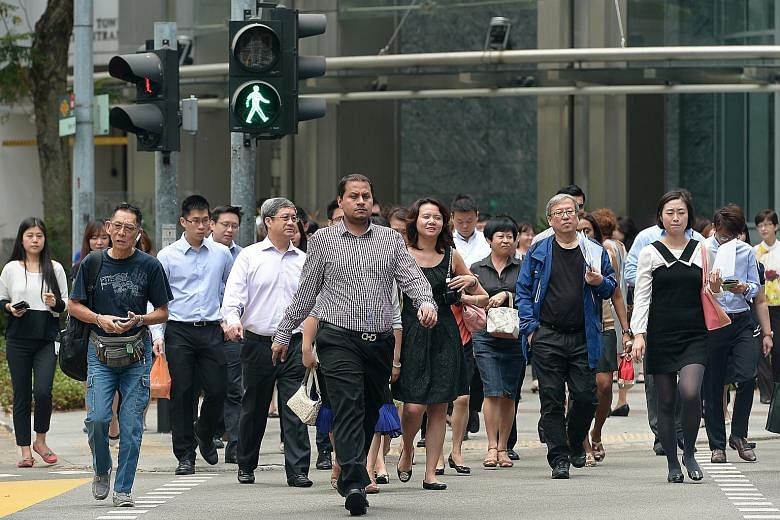Older workers will be able to work until age 67 from July this year.
If employers cannot find work for such workers in their companies, they can transfer them to their subsidiaries or another employer with the workers' consent, or give them a one-off payment as a last resort.
Employers will also not be allowed to cut the salary of workers who turn 60 from July.
These changes to the Retirement and Re-employment Act, passed in Parliament yesterday, will apply to Singaporeans and permanent residents who turn 65 from July.
Employers will be required to re-hire these workers if they have satisfactory work performance and are healthy and able to continue working.
-
12%
-
Proportion of residents aged 60 and above in the labour force in 2015.
The move will benefit the increasing ranks of older workers who want to continue to work, said Manpower Minister Lim Swee Say.
The proportion of residents aged 60 and above in the labour force increased from 5.5 per cent in 2006 to 12 per cent in 2015.
"As we live longer, we can expect this proportion to continue to grow," Mr Lim told the House.
Allowing employers to transfer older workers to another employer benefits both workers and employers, he added. "The employee will have more opportunities to be re-employed... The second employer will benefit from hiring an employee with experience," he said.
On removing the law that allows employers to cut the pay of workers at age 60, Mr Lim said that joint efforts by unions, employers and the Government have been successful in getting companies to move away from a wage system where they peg salaries to years of service.
The wage-cut provision was introduced in 1999 when the retirement age was raised from 60 to 62 to help employers manage their wage bills. But by 2011, this was already not practised by 98.5 per cent of companies with employees aged 60 and above, said Mr Lim.
Several MPs also called for safeguards to ensure that employers do not abuse the flexibility the new law gives them.
Labour MP Patrick Tay (West Coast GRC) urged the Manpower Ministry (MOM) to monitor employers who may abuse the new provision that allows them to transfer workers to another employer, as there may be cases where "the terms, conditions, environment and nature of work in the new job may vastly differ from what they had been previously employed in".
Non-Constituency MP (NCMP) Leon Perera said the law does not require employers to state reasons for terminating employment contracts, thereby allowing employers to discriminate against older workers and dismiss them without leaving a paper trail.
Labour MP Zainal Sapari (Pasir Ris-Punggol GRC) was worried that subsidiaries the workers are transferred to might manipulate the re-hiring terms after the transfer. He suggested holding the main employer responsible for the older workers, even after the transfer.
Mr Zainal and NCMP Daniel Goh called for the retirement age of 62 to be done away with completely, given that the re-employment age is being raised from 65 to 67.
Responding, Mr Lim said that the MOM will monitor the implementation of the law closely to prevent abuses.
On doing away with the retirement age, Mr Lim said that re-employment differs from retirement in that while it allows a worker to keep working, the worker need not be re-hired to do the same work or be receiving the same pay.
The minister also disclosed that the Government is reviewing the wage subsidies it currently gives to employers who hire older workers.
The incentives will expire in July and a decision will be made "well ahead" of that month, said Mr Lim.
Yesterday, the National Trades Union Congress, Singapore National Employers Federation and MOM also issued updated guidelines to help employers prepare for the changes from July.
The guidelines were similar to what the three parties issued in May last year.
The one-off Employment Assistance Payment or golden handshake for workers aged 62 when employers cannot re-hire them is set at 3.5 times the monthly gross salary, and between $5,500 and $13,000.
The amount of the payment, which is provided for but not spelt out under the law, is at the discretion of the employer.


